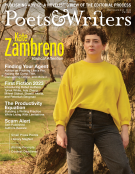When Greg Marshall began writing the essays that would become his memoir, Leg: The Story of a Limb and the Boy Who Grew From It (Abrams Press, June 2023), he wanted to explore growing up in Utah and what he calls “the oddball occurrences in my oddball family.” He says, “I wanted to call the book Long-Term Side Effects of Accutane and pitch it as Six Feet Under meets The Wonder Years.” But in 2014 he discovered his diagnosis of cerebral palsy, information his family had withheld from him for nearly thirty years, telling him he had “tight tendons” in his leg. This revelation shifted the focus of the project, which became an “investigation into selfhood, uncovering the untold story of my body,” says Marshall. Irreverent and playful, Leg reckons with disability, illness, queerness, and the process of understanding our families and ourselves.

Greg Marshall, author of Leg: The Story of a Limb and the Boy Who Grew From It. (Credit: Lucas Schaefer)
“Perhaps no literary magazine editor has done more to shape the course of Leg than Yi Shun Lai,” says Marshall. In 2017 in Tahoma Literary Review, Lai published Marshall’s essay “Lies My Mother Told Me,” about the newspaper column his mother wrote from 1997 to 2002; printed in community and business periodicals in the western U.S., the column covered her experience with non-Hodgkin’s lymphoma, people living with illness, and their family. Lai, who at the time was the journal’s nonfiction editor, urged Marshall to more rigorously research the column and confront familial and cultural narratives around illness and disability that are now central to Leg. The journal is committed to offering constructive feedback and paying for accepted work ($55 for shorter pieces or $135 for longer ones). Published three times a year in print and in e-reader format, the journal will open to submissions of poetry, fiction, and nonfiction via Submittable in August.
Marshall says he “figured out Leg’s playful, wistful, sharp-tongued tone” while writing “Suck Ray Blue” (a play on the French phrase “sacré bleu”). The essay, about a middle-school trip to Paris, was later published in a fiftieth anniversary issue of Tampa Review. Faculty members of the University of Tampa who edit the journal select poetry, fiction, nonfiction, translation, and cross-genre work for the print biannual as well as occasional online features. Marshall praises Tampa Review’s print edition as a “polished, artistic finished project,” which the editors describe as “a gallery space in print” that follows in the tradition of book arts and illuminated manuscripts. Submissions in all genres will be open via Submittable from September 1 to December 31.
Off Assignment is “a travel magazine that breaks the rules by making the rules: Contributors can respond to one of a handful of place- and travel-based prompts,” says Marshall, who is a contributor and advisory board member of the online publication. “The name of the magazine comes from the idea that some of the best stories come when we stray from the assigned article or story we’re reporting.” The magazine releases all of its work in themed columns; subjects include “words that resist translation into English”; “brief, ambient portraits of places at a specific time of day”; and “Letter to a Stranger,” the title of a regular column. Marshall commends the magazine’s collaborative and kind editing process as well as its “innovative, inclusive, fun-loving spirit.” Off Assignment has published writers such as Melissa Febos, Pico Iyer, and Lauren Groff. Submissions are open year-round via Submittable.
Marshall says that placing his essay “Secksi” with print biannual Foglifter made him a braver writer. “It showed me that there is a market for frank depictions of intimacy and sex from a disabled perspective. Especially when I’m writing about disability, I don’t want my work to feel neutered,” he says. Foglifter, which publishes poetry, fiction, nonfiction, and hybrid work by queer and trans writers, encourages “transgressive, risky, challenging subject matter” and “innovative formal choices.” Foglifter Press also publishes anthologies and chapbooks and collaborates with the Rumpus on the “Queer Syllabus” project, through which writers publish short online posts about authors or books they believe represent a queer literary canon. Submissions to the magazine will be open in all genres from September 1 to November 1.
“In composing essays it can be important to occasionally get back to basics for me,” says Marshall. “In a genre that’s filled with nuance, it helps me to return to the idea of a simple arc, an epiphany: What’s the takeaway here? Remind me again why I just spent a thousand words with you?” Marshall asked these questions while revising an essay on marrying his husband, which he published in Transformations, an online magazine specializing in narrative nonfiction on life-changing experiences. Editor Steven Beschloss launched the journal at Arizona State University during the pandemic, noting how compelling personal stories can help drive social transformation. The editors are open to pitches and submissions year-round via e-mail.
Dana Isokawa is the editor in chief of the Margins and a contributing editor of Poets & Writers Magazine.








